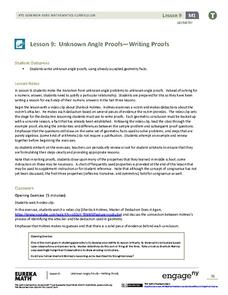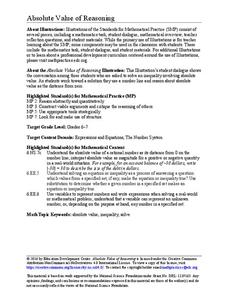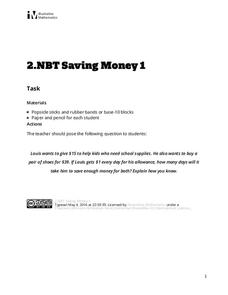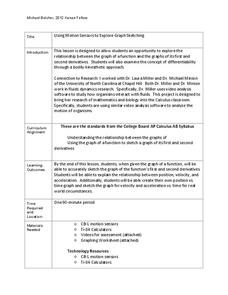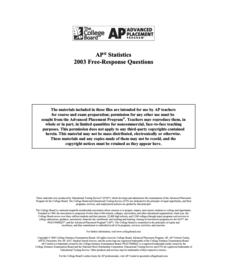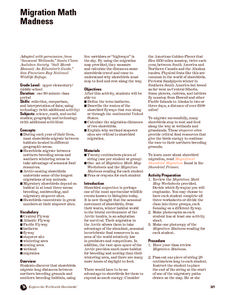Rivanna Regional Stormwater Education Partnership
Does It Soak Right In?
Which materials are best for groundwater runoff, and which are best for percolation? Discuss the water table with several experiments about different types of soil, pollution, precipitation, and filtration. The experiments assign...
EngageNY
Unknown Angle Proofs—Writing Proofs
What do Sherlock Holmes and geometry have in common? Why, it is a matter of deductive reasoning as the class learns how to justify each step of a problem. Pupils then present a known fact to ensure that their decision is correct.
K5 Learning
Mixed Practice Word Problems #7
Five questions make up a mixed practice learning exercise. Pupils use their skills in addition, subtraction, and multiplication to answer word problems consisting of numbers up to 130.
K5 Learning
Mixed Practice Word Problems #9
Reinforce math concepts of multiplication, division, area, cups, and perimeter, with a mixed practice worksheet that offers five word problems.
EngageNY
Getting a Handle on New Transformations 1
In the first of a two-day lesson plan on transformations with matrix notation the class transforms the unit square using general transformations, then calculates the area of the transformed image. They discover it is the same as...
Education Development Center
Interpreting Statistical Measures—Class Scores
Explore the effect of outliers through an analysis of mean, median, and standard deviation. Your classes examine and compare these measures for two groups. They must make sense of a group that has a higher mean but lower median compared...
Education Development Center
Choosing Samples
What makes a good sample? Your classes collaborate to answer this question through a task involving areas of rectangles. Given a set of 100 rectangles, they sample a set of five rectangles to estimate the average area of the figures. The...
Curated OER
Restaurant math
Sixth graders use Microsoft Publisher program to create a restaurant menu. Using that menu, other students will use estimation skills to decide on multiple combinations of meals they could make with the money they are given.
K-5 Math Teaching Resources
Blank Number Lines Template
It's no secret that number lines are one of the most useful tools for elementary math teachers. Offering a series of six separate number lines of differing scales, this versatile template can be used when teaching about...
EngageNY
Logarithms—How Many Digits Do You Need?
Forget your ID number? Your pupils learn to use logarithms to determine the number of digits or characters necessary to create individual ID numbers for all members of a group.
EngageNY
End-of-Module Assessment Task: Pre-Calculus Module 4
Challenge your scholars to show what they know about the Law of Sines, Law of Cosines, and inverses. The six-question assessment is the last in a series of 16. Pupils find the area of triangles and show that the Law of Sines and Law of...
School District of Palm Beach County
Egyptian Hieroglyphs
Humans have been developing number systems for thousands of years, and while they can be very different from one another, they can also share surprising similarities. Take your young mathematicians on a journey through the history...
Laura Candler
Fishbowl Multiplication
Transition young mathematicians from using repeated addition to multiplication with this fun, hands-on activity. Using manipulatives and the included game board, students work in pairs modeling repeated addition problems before...
Math Learning Center
Grade 1 Supplement Set A4 – Number and Operations: Equivalent Names
Engage young mathematicians in developing their basic arithmetic skills with these great hands-on activities. Using Unifix® cubes to model a variety of single digit addition and subtract problems, children build a basic...
Education Development Center
Absolute Value Reasoning
Teach solving absolute value inequalities through inquiry. Groups use their knowledge of absolute value and solving inequalities to find a solution set to an absolute value inequality. Working collaboratively encourages discussion,...
Illustrative Mathematics
Growing Bean Plants (Grade 2)
After planting a bean seed in a jar, young scientists observe the growth patterns over several days. As the bean becomes a sprout, and the sprout becomes a plant, partners measure and plot the data. They notice patterns, practice...
Illustrative Mathematics
Saving Money 1
How many days will it take Louis to save enough money for school supplies and new pair of shoes? Focus on Common Core math standards with a two-part task that involves a word problem and counting manipulatives.
Kenan Fellows
Using Motion Sensors to Explore Graph Sketching
Get moving to a better understanding of graphs of derivatives. Using motion sensors, scholars vary their velocities to create graphs of the first derivative of a function. The activity challenges groups to first create a script of the...
College Board
2003 AP® Statistics Free-Response Questions
Hypothetically, knowing the structure of a test should help. Pupils use the released free-response questions from the 2003 AP® Statistics exam to become aware of the structure of questions on the test. Half the questions in the set...
Prince William Network
Migration Math Madness
A great way to incorporate math into life science, this lesson has learners measure migratory routes on a map and calculate the actual distance that shorebirds on the routes would cover. Learners compute the distance covered in both...
IOP Institute of Physics
Physics in Concert
What do physicists and musicians have in common? A lot more than you might think. After first viewing a slide show presentation and completing a series of skills practice worksheets on the physics of light, sound, and...
Fall River Schools
Parabolas Are All Around Us
Moving parabolas off of graph paper and into the real world is the task at hand in this detailed poster project. First, learners perform a cumulative activity identifying many characteristics of an assigned quadratic equation. Next, they...
K-5 Math Teaching Resources
Base Ten Mat (Tens and Ones with Tens Frame)
Working with base 10 blocks? Use this base 10 mat to organize blocks, tens and ones with one ten frame, and determine how many groups of blocks can be used to represent numbers.
EngageNY
Incredibly Useful Ratios
Start the exploration of trigonometry off right! Pupils build on their understanding of similarity in this instructional activity that introduces the three trigonometric ratios. They first learn to identify opposite and adjacent...



